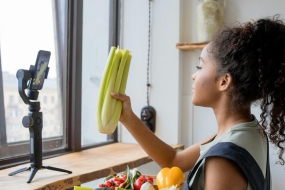When people think of influencer marketing, they often associate it with B2C brands, lifestyle influencers, and social media personalities promoting fashion, beauty, or tech products.
However, influencer marketing is equally powerful in the B2B space—if not more—because trust, credibility, and expertise play a critical role in decision-making.
B2B buyers are highly discerning, conducting extensive research before making purchasing decisions. This is where influencer marketing comes in: by leveraging industry experts, thought leaders, and niche creators, B2B brands can enhance credibility, nurture leads, and drive conversions.
Why Influencer Marketing Works for B2B
Unlike B2C influencer marketing, where mass appeal and emotional connections often drive purchases, B2B influencer marketing is rooted in expertise, trust, and long-term relationships. Decision-makers rely on industry authorities for insights and recommendations, making thought leaders and niche experts key players in shaping purchasing behavior.
Here’s how B2B brands can leverage influencer marketing to their advantage:
1. Partnering with LinkedIn Influencers for Authority and Reach
LinkedIn is the go-to platform for B2B networking and thought leadership, making it a prime space for influencer collaborations. Brands can work with respected professionals who have a strong following and influence within their industry. These influencers can:
- Share insights about industry trends and innovations.
- Endorse products or services through long-form posts, articles, and videos.
- Engage in discussions that highlight a brand’s solutions in a meaningful way.
Example: Adobe partnered with LinkedIn influencers in the creative and marketing space to drive awareness about its B2B offerings, using expert content to highlight the software’s business applications.
2. Webinars and Live Events for Thought Leadership
Hosting or sponsoring webinars with respected industry professionals is another powerful way for B2B brands to showcase their expertise. Webinars not only provide educational value but also allow brands to interact with potential customers in a more personal and engaging format.
Influencers can participate as guest speakers, moderators, or panelists, lending credibility and attracting a highly targeted audience. This type of collaboration positions the brand as a leader in its field while nurturing leads through informative, trust-building interactions.
Example: HubSpot frequently collaborates with marketing influencers for live webinars, Q&A sessions, and panel discussions, reinforcing its authority in the digital marketing space.
3. Content Collaborations: Blogs, Reports, and Case Studies
Influencer marketing in B2B often revolves around valuable content. Collaborating with thought leaders to co-create whitepapers, research reports, blog posts, and case studies can help brands position themselves as trusted resources in their industry.
This content can be shared across multiple channels, including LinkedIn, company websites, and email marketing campaigns, ensuring a broad yet targeted reach.
Example: IBM regularly works with tech influencers and industry analysts to create data-driven reports and insights, helping businesses understand complex technologies like AI and cloud computing.
4. Niche Podcast and YouTube Collaborations
Podcasts and YouTube channels focused on specific industries are growing in popularity as trusted sources of information. Partnering with podcast hosts or YouTube influencers in a given niche allows brands to tap into an engaged audience actively seeking expert insights.
B2B brands can sponsor episodes, appear as guests, or collaborate on deep-dive video content that educates and informs potential clients.
Example: Salesforce has successfully partnered with business-focused podcast hosts and YouTube creators to discuss CRM trends and customer relationship strategies, reinforcing its position as an industry leader.
5. Leveraging Employee Advocacy and Internal Influencers
Sometimes, the most effective influencers are within a company itself. Employees—especially executives, subject matter experts, and top sales professionals—can act as brand advocates by sharing insights, engaging in industry conversations, and creating content that reflects their expertise.
Encouraging employees to build their personal brands and engage with their networks can help a B2B company organically extend its reach and influence.
Example: Microsoft’s leadership team frequently shares thought leadership content on LinkedIn, reinforcing the company’s role in shaping the future of technology.
Key Metrics for Measuring B2B Influencer Marketing Success
Like any marketing strategy, B2B influencer campaigns should be data-driven. Key performance indicators (KPIs) include:
- Engagement metrics: Likes, shares, comments, and interactions on influencer content.
- Lead generation: New sign-ups, demo requests, or downloads from influencer-driven content.
- Brand sentiment: How influencer collaborations impact trust and credibility.
- Conversion rates: Direct impact on sales or business inquiries.
Final Thoughts: B2B Influence is Built on Trust
In B2B marketing, influence isn’t about mass appeal—it’s about expertise, trust, and providing real value to decision-makers. By leveraging LinkedIn influencers, thought leaders, webinars, and content collaborations, brands can establish authority, nurture relationships, and ultimately drive conversions.
The key is to choose influencers who align with your brand’s values and audience, focusing on long-term relationships rather than one-off promotions. When done right, influencer marketing becomes a powerful tool for driving meaningful business growth in the B2B space.









